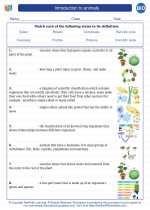Expression in Biology
Expression in biology refers to the process by which the information encoded in a gene is used to direct the synthesis of a functional gene product, which can be a protein or a functional RNA molecule. This process involves two main stages: transcription and translation.
Transcription:
Transcription is the first step in gene expression and involves the synthesis of an RNA molecule from a DNA template. The enzyme RNA polymerase catalyzes this process by binding to the DNA at the beginning of a gene and then "reading" the DNA sequence to build a complementary RNA molecule. This RNA molecule, called messenger RNA (mRNA), carries the genetic information from the DNA to the ribosomes, where it will be translated into a protein.
Translation:
Translation is the process by which the genetic information carried by the mRNA is used to direct the synthesis of a specific protein. It takes place in the ribosomes and involves the participation of transfer RNA (tRNA) molecules, which carry amino acids and match them to the appropriate codons on the mRNA. As the ribosome moves along the mRNA, it facilitates the bonding of amino acids to form a polypeptide chain, which will eventually fold into a functional protein.
Regulation of Gene Expression:
Gene expression is tightly regulated in cells to ensure that the right genes are expressed at the right times and in the right amounts. This regulation can occur at various levels, including transcriptional, post-transcriptional, translational, and post-translational levels. Factors such as environmental signals, developmental cues, and cell signaling pathways can influence gene expression.
Study Guide:
- Understand the central dogma of molecular biology, which describes the flow of genetic information from DNA to RNA to protein.
- Learn the process of transcription, including the role of RNA polymerase and the formation of mRNA.
- Study the process of translation, including the roles of ribosomes and tRNA in protein synthesis.
- Explore the regulation of gene expression and the various mechanisms by which gene expression is controlled in cells.
Understanding gene expression is crucial in grasping the fundamental processes that govern the functioning of living organisms and is essential for further studies in genetics, molecular biology, and biotechnology.
.◂Biology Worksheets and Study Guides High School. Introduction to animals
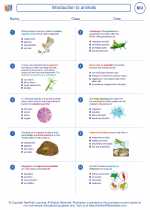
 Worksheet/Answer key
Worksheet/Answer key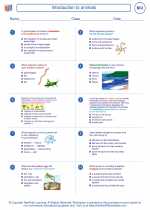
 Worksheet/Answer key
Worksheet/Answer key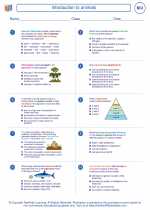
 Worksheet/Answer key
Worksheet/Answer key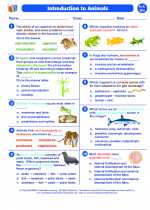
 Vocabulary/Answer key
Vocabulary/Answer key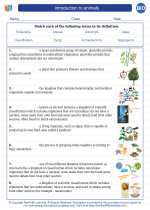
 Vocabulary/Answer key
Vocabulary/Answer key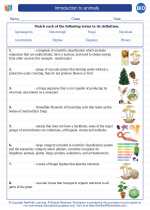
 Vocabulary/Answer key
Vocabulary/Answer key